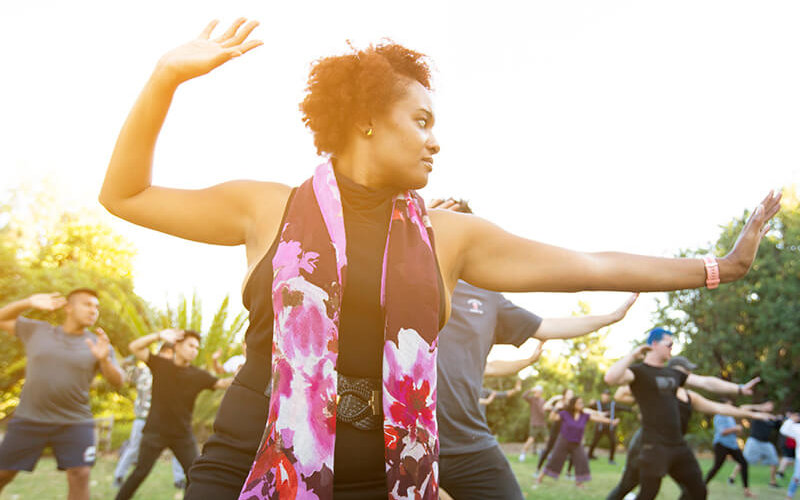
Exercising, getting your nails done and eating comfort foods are quick and common self-care habits that can temporarily relieve stress. However, these habits alone may not be sustainable or accessible for everyone who wants to manage their stress in the long term.
Portia A. Jackson Preston, assistant professor of public health at Cal State Fullerton, studies stress management and wellness practices for diverse populations. She has published research on practices that promote well-being for Black women and for public health workers. She has also presented two TEDx talks discussing topics like self-care, gardening and resilience.
Self-care should also involve nurturing work that goes beyond the surface layer. A lasting self-care and wellness plan that can effectively manage stress should honor personal experiences and individual backgrounds, Jackson Preston says.
“It’s really about teaching people systems that are tailored to their journey, and that embrace their culture rather than shame it,” Jackson Preston explained.
Jackson Preston created a wellness journey framework that offers starting points for putting together a personalized wellness plan. She recently discussed what sustainable self-care can look like, especially for people from historically underrepresented groups.
Step One: Start Small
In Jackson Preston’s research, study participants said looking inward, exploration and reconnection were some of the most helpful facets of their self-care journeys. Jackson Preston says it’s important to take time and learn what holistic activities your body and mind responds to.
“It doesn’t have to look like you’re doing it perfectly,” Jackson Preston says. “As someone with an illness, I’m aware of my limitations. My physical wellness looks different from other people’s.”
When getting started, small but effective actions can include shutting off or silencing your phone for two minutes, drinking one cup of water, and noticing the color of the sky.
“Tiny steps, tiny steps,” Jackson Preston said. “I’m not about trying to introduce rituals that take you out of your life. It’s an intentional journey. I want people to know that it’s not only important, but also necessary to show up as your messy, uncurated self.”
Step Two: Personalize Your Plan
Jackson Preston says practicing wellness doesn’t require being wealthy, having lots of extra time, or learning unfamiliar new age rituals. Everyone’s path to wellness should look and feel unique, Jackson Preston says.
“Maybe I have these cultural foods that really mean a lot to me because they remind me of family connectedness, but the frequency with which I’m eating them, the amount in which I’m eating them, or the habits that we have are really not serving my highest good,” Jackson Preston says.
Jackson Preston encourages creating a wellness plan that incorporates meaningful traditions. It’s about prioritizing and valuing what matters most to the individual.
“For example, my mother and I would love to talk everyday, but I also have so much to do.” Jackson Preston said. “I’ve told her ‘Call anytime you want. I will answer the phone if I can.’ But, I will try to make sure at least once per week, we have a conversation where she can talk about whatever she wants for as long as she wants, and I will not interrupt her. That has been sustainable.”
Step Three: Caring for Your Community Starts With Yourself
Jackson Preston said many people, such as first-generation students, are vulnerable to stress while pursuing an education or career because they see it as a pathway to transform their entire family’s lives.
“It’s a really significant investment of their time and energy,” Jackson Preston said.
Jackson Preston said she promotes self-care as community care, noting that individuals versed in self-care can eventually help others care for themselves and find resources. As a person living with a chronic illness, her goal is to teach others how important it is to protect their health and well-being.
“I think I am a much more gracious professor now than when I was accessible all the time,” Jackson Preston said. “Now that my students know that they’re going to get 24-hour responses during the week and 48-hour ones on the weekends, I show up better. I’m far more understanding of the things that they’re dealing with during this pandemic.
“My boundaries have taught my students that it’s okay for them to have boundaries,” she said.